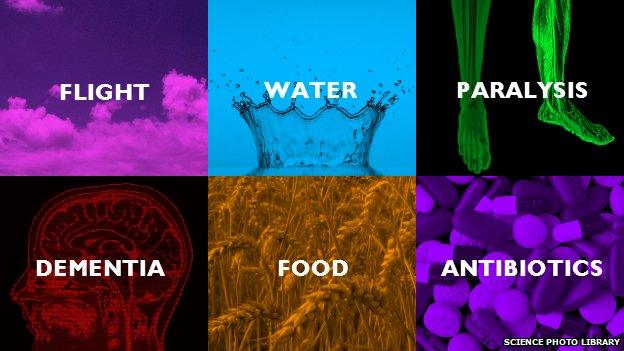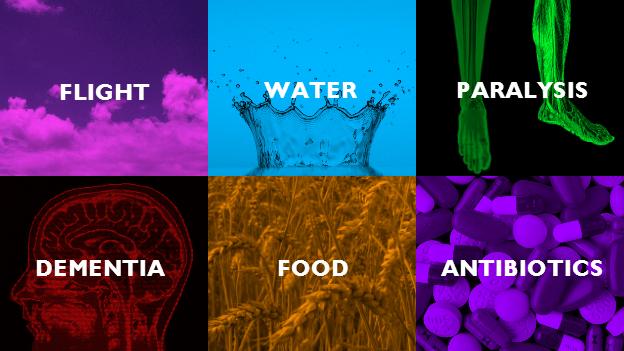Longitude Prize: how to choose what to vote for
- Published

There's a week left of a big vote to decide which is the biggest scientific problem facing mankind today.
Flight - How can we fly without damaging the environment?
Food - How can we ensure everyone has healthy, sustainable food?
Antibiotics - How can we prevent bacteria becoming resistant to antibiotic medicines?
Paralysis - How can we restore movement to people who are paralysed?
Water - How can we ensure everyone has access to safe and clean water?
Dementia - How can we help people with dementia live independently for longer?
Check out our video guides to each problem further down the page...
The UK public is choosing one of six global problems is the most important for scientists to solve - for the chance to win £10million.
The competition is called the Longitude Prize, and commemorates 300 years since the first challenge was set.
The problem with the most public votes will be announced on 25 June, and in September the competition begins!
Voting takes place via the BBC's Horizon website - you'll need to create a BBC ID to sign in.
How to choose?
If you're looking to vote, how should you choose? If you feel strongly about one of the issues, you might think it's an easy choice.
But before you pick your issue, have a think about how it compares to the other five - and how they could be connected.
Far v near: Is the issue more important because you know someone who suffers from it, or is the the number of people in the world affected the biggest concern? You may not know someone who is malnourished, but morally speaking can we ignore people because they are far away?
Long v short term: Should we tackle long-term problems with big consequences, like climate change, or focus on immediate issues like access to food and water, or paralysis? Climate change may make food and water harder to come by for more of us in the future.
Humans v Nature: Do we only consider the impact on humans or do animals and nature count too?
Water
How can we ensure everyone has access to safe and clean water? Watch Martin's report below
Watch Martin's report on water
Food
How can we grow enough nutritious food for a growing population? Watch Nel's report.
Watch Nel's report about food production
Antibiotics
How can we prevent bacteria becoming resistant to antibiotic medicines? Jenny's been having a look.
Jenny's been taking a look at antibiotics
Paralysis
How can we restore movement to people who are paralysed? Watch Jenny's report on this issue.
Watch Jenny's report on paralysis
Flight
How can we fly without damaging the environment? Nel has the report.
How can we fly without damaging the environment?
Dementia
How can we help people with dementia live independently for longer? Ayshah has more.
Longitude Prize - Dementia
- Published22 May 2014

